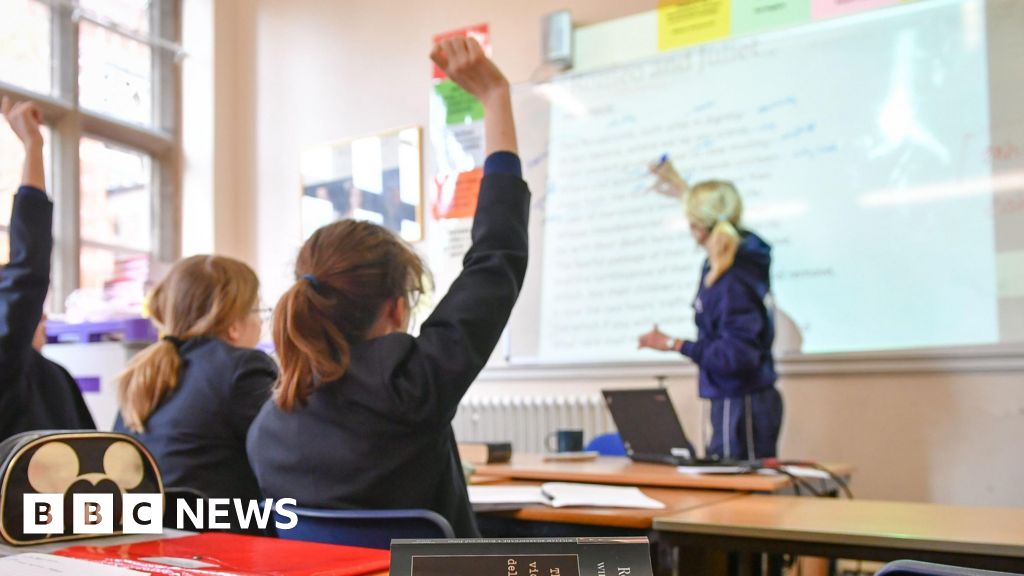ARTICLE AD BOX
Image source, Getty Images
Up to eight more nuclear reactors could be built on existing sites as part of the UK's new energy strategy.
The plan, which aims to boost UK energy independence and tackle rising prices, also includes plans to increase wind, hydrogen and solar production.
But experts have called for a bigger focus on energy efficiency and improving home insulation.
Consumers are facing soaring energy bills after the Russian invasion of Ukraine pushed gas prices even higher.
Under the government's new plans, up to 95% of the UK's electricity could come from low-carbon sources by 2030.
It outlines, for example, the hope of producing up to 50 gigawatts (GW) of energy through offshore wind farms, which the Department for Business, Energy and Industrial Strategy (Beis) said would be more than enough to power every home in the UK.
But one of the big points of contention is thought to have been the construction of onshore wind turbines.
Nuclear plans
The government announced that a new body called Great British Nuclear will also be launched to bolster the UK's nuclear capacity, with the hope that by 2050 up to 24 GW of electricity will come from that source - 25% of the projected electricity demand.
It has said the focus on nuclear will deliver up to eight reactors overall, with one being approved each year until 2030.
It also confirmed advanced plans to approve two new reactors at Sizewell in Suffolk during this parliament.
Wylfa in Anglesey and Oldbury in Cumbria have also been named as candidates to host either large-scale plants, smaller modular nuclear reactors, or possibly both.
Funding the construction of new nuclear power stations has proved challenging in recent years as they are expensive to build.
Critics of nuclear power say new facilities take so long to come on stream they will be too late to meet the UK's emissions targets or to reduce energy prices.
But Tom Greatrex, boss of the Nuclear Industry Association, said the plans marked a "vital step forward" for the UK to meet its climate goals, and could create thousands of jobs.
"The ambition and determination to do much more and quicker is very welcome," he said.
The government also said it will also reform planning rules to slash approval times for new offshore wind farms.
For onshore wind, the strategy only commits to consulting on developing partnerships with "a limited number of supportive communities" who want to host wind turbines in exchange for lower energy bills.
Although it is one of the cheapest forms of energy, new onshore wind projects have been declining since 2015 when the government ended subsidies and introduced stricter planning rules in response to some complaints that wind turbines were an eyesore and noisy.
Targets for hydrogen production are also being doubled.
As well as increasing the production of renewable energy, there are also plans to accelerate North Sea oil and gas projects.
A new licensing round for the projects is set for the autumn.
The government said it recognised the importance of these fuels to energy security "and that producing gas in the UK has a lower carbon footprint than imported from abroad".
Environmentalists and many energy experts have reacted with disbelief and anger at some of the measures in the strategy.
They cannot believe the government has offered no new policies on saving energy by insulating buildings.
They say energy efficiency would immediately lower bills and emissions, and is the cheapest way to improve energy security.
A Downing Street source said the strategy was now being see as an energy supply strategy.
Campaigners are also furious that ministers have committed to seeking more oil and gas in the North Sea, even though humans have already found enough fossil fuels to wreck the climate.
There is a strong welcome, though, for the promise of more energy from wind off-shore with speedier planning consent
The same boost has not been offered to onshore wind.
The decision to boost nuclear has drawn a mixed reaction. Some environmentalists say it's too dear and too dangerous. They ridicule the idea from some politicians that every city could have its own mini reactor.
But other climate campaigners believe nuclear must be part of the energy mix.
'Fails the exam question'
Green Party co-leader Adrian Ramsay said the new strategy "did not serve the needs of people or the climate".
UK energy prices have been rising for months due to surging demand as Covid restrictions eased. But the Russian invasion of Ukraine pushed up costs up even further.
Although Russian imports account for only 8% of UK oil and 5% of gas supplies, it is still affected by rising wholesale prices worldwide and household budgets have come under pressure.
Mr Ramsay suggested that if the government was "concerned about energy bills and taking real climate action, it would be going even further on on-shore wind."
Image source, Getty Images
The plan was welcomed by offshore wind firm Orsted, trade association Hydrogen UK, Shell and EDF, among others.
But Ed Miliband, Labour's shadow climate change and net-zero secretary, said: "The government's energy relaunch is in disarray.
"Boris Johnson has completely caved to his own backbenchers and now, ludicrously, his own energy strategy has failed on the sprint we needed on onshore wind and solar, the cheapest, cleanest forms of homegrown power.
"This relaunch will do nothing for the millions of families now facing an energy bills crisis," he added.
Liberal Democrat leader Sir Ed Davey also described the plans as "utterly hopeless", while the SNP's Stephen Flynn called it a "missed opportunity".
Dr Simon Cran-McGreehin, head of analysis at the Energy & Climate Intelligence Unit, told the BBC that he also felt "underwhelmed" following the announcement.
"We started off with a price crisis during the winter, we're now potentially heading into a supply crisis.
"This is an immediate problem that needs solutions now, and this doesn't do anything on prices.
"It tries to do some things on energy supply, but they're all medium to long-term measures. So it does seem to fail the exam question," he said.
Prime Minister Boris Johnson said in a statement that the strategy would "reduce our dependence on power sources exposed to volatile international prices we cannot control, so we can enjoy greater energy self-sufficiency with cheaper bills".
Business and Energy Secretary Kwasi Kwarteng added: "Scaling up cheap renewables and new nuclear, while maximising North Sea production, is the best and only way to ensure our energy independence over the coming years," he added.

 3 years ago
33
3 years ago
33








 English (US) ·
English (US) ·